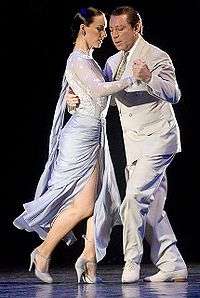Definify.com
Definition 2026
Tango
tango
tango
English
Noun
tango (plural tangos or tangoes)
- A Standard ballroom dance in 4/4 time; or a social dance, the Argentine tango.
- A piece of music suited to such a dance.
- The letter T in the ICAO spelling alphabet.
- (slang) enemy, used amongst special police forces, derived from the abbreviation of target using the NATO phonetic alphabet.
- A dark orange colour shade; deep tangerine
-
tango colour:
-
Translations
Verb
tango (third-person singular simple present tangoes, present participle tangoing, simple past and past participle tangoed)
- To dance the tango.
- (slang, intransitive) To mingle or interact (with each other).
- 2013, Kathy Casey, D'Lish Deviled Eggs (page 67)
- Creamy cheese, tangy-sweet peppers, and a hit of heat tango in this sexy deviled-egg combo.
- 2013, Kathy Casey, D'Lish Deviled Eggs (page 67)
See also
Anagrams
Cebuano
Pronunciation
- Hyphenation: ta‧ngo
Noun
tango
- A tooth with a single cusp; a cuspid; a canine.
- A fang; a long, pointed canine tooth used for biting and tearing flesh or injecting venom.
- A tusk; one of a pair of elongated pointed teeth that extend outside the mouth of an animal such as a walrus, elephant or wild boar.
Verb
tango
- To nod.
Czech
Noun
tango n
- tango (Standard ballroom dance in 4/4 time; or a social dance, the Argentine tango)
Danish
Etymology
Pronunciation
- IPA(key): /tanɡo/, [ˈtˢɑŋɡ̊o]
Noun
tango c (singular definite tangoen, plural indefinite tangoer)
Inflection
| common gender |
Singular | Plural | ||
|---|---|---|---|---|
| indefinite | definite | indefinite | definite | |
| nominative | tango | tangoen | tangoer | tangoerne |
| genitive | tangos | tangoens | tangoers | tangoernes |
Finnish
Pronunciation
- IPA(key): /ˈtɑŋːo/
- Hyphenation: tan‧go
Noun
tango
Declension
| Inflection of tango (Kotus type 1/valo, no gradation) | |||
|---|---|---|---|
| nominative | tango | tangot | |
| genitive | tangon | tangojen | |
| partitive | tangoa | tangoja | |
| illative | tangoon | tangoihin | |
| singular | plural | ||
| nominative | tango | tangot | |
| accusative | nom. | tango | tangot |
| gen. | tangon | ||
| genitive | tangon | tangojen | |
| partitive | tangoa | tangoja | |
| inessive | tangossa | tangoissa | |
| elative | tangosta | tangoista | |
| illative | tangoon | tangoihin | |
| adessive | tangolla | tangoilla | |
| ablative | tangolta | tangoilta | |
| allative | tangolle | tangoille | |
| essive | tangona | tangoina | |
| translative | tangoksi | tangoiksi | |
| instructive | — | tangoin | |
| abessive | tangotta | tangoitta | |
| comitative | — | tangoineen | |
Anagrams
Italian
Verb
tango
- first-person singular present indicative of tangere
Noun
tango m (plural tanghi)
Anagrams
Latin
Etymology
From Proto-Italic *tangō, nasal infix present from Proto-Indo-European *teh₂g-. Cognate with Ancient Greek τάσσω (tássō), τεταγών (tetagṓn)[1], Old English þaccian (“to touch, pat”). More at thack, thwack.
Pronunciation
- (Classical) IPA(key): /ˈtan.ɡoː/, [ˈtaŋ.ɡoː]
Verb
tangō (present infinitive tangere, perfect active tetigī, supine tāctum); third conjugation
- (transitive) I touch, grasp.
- Noli me tangere.
- Don't touch me.
- Noli me tangere.
- (transitive) I reach, arrive at.
- (transitive) I attain to.
- (transitive) I move, affect.
- (transitive) I come home to.
Inflection
Derived terms
Related terms
Descendants
References
- tango in Charlton T. Lewis and Charles Short (1879) A Latin Dictionary, Oxford: Clarendon Press
- tango in Charlton T. Lewis (1891) An Elementary Latin Dictionary, New York: Harper & Brothers
- Félix Gaffiot (1934), “tango”, in Dictionnaire Illustré Latin-Français, Paris: Hachette.
- Meissner, Carl; Auden, Henry William (1894) Latin Phrase-Book, London: Macmillan and Co.
- the lightning has struck somewhere: fulmen locum tetigit
- to be struck by lightning: fulmine tangi, ici
- to be struck by lightning: de caelo tangi, percuti
- the country-house stands near the road: villa tangit viam
- to be contiguous, adjacent to a country: tangere, attingere terram
- to touch briefly on a thing: breviter tangere, attingere aliquid
- to make a cursory mention of a thing; to mention by the way (not obiter or in transcursu): strictim, leviter tangere, attingere, perstringere aliquid
- you have hit the nail on the head: rem acu tetigisti
- the lightning has struck somewhere: fulmen locum tetigit
- ↑ De Vaan, Michiel (2008) Etymological Dictionary of Latin and the other Italic Languages (Leiden Indo-European Etymological Dictionary Series; 7), Leiden, Boston: Brill
Portuguese

Etymology
Borrowing from Spanish tango, probably from a Niger-Congo language.
Pronunciation
Noun
tango m (plural tangos)
- tango (ballroom dance)
- a style of music associated with the tango dance (used to accompany and set the beat for the dance)
Verb
tango
- first-person singular present indicative of tangar
Serbo-Croatian
Pronunciation
- IPA(key): /tânɡo/
- Hyphenation: tan‧go
Noun
tȁngo m (Cyrillic spelling та̏нго)
- tango (dance)
Declension
Spanish
Etymology
Probably from a Niger-Congo language, but an onomatopoeic origin for the dance has been suggested as well.
Noun
tango m (plural tangos)
- tango (ballroom dance)
- a style of music associated with the tango dance (used to accompany and set the beat for the dance)